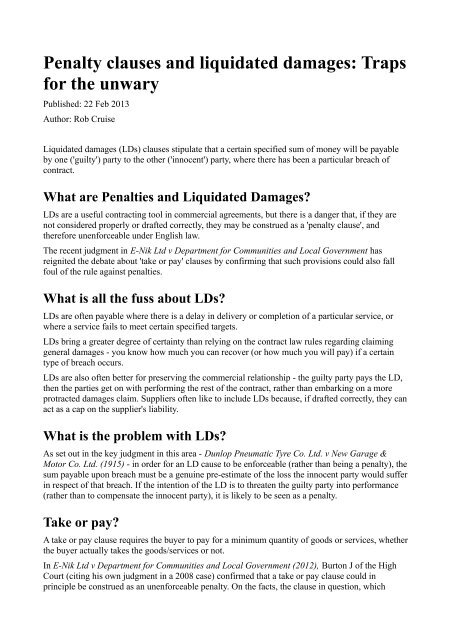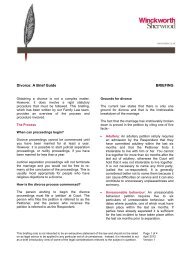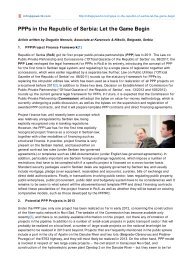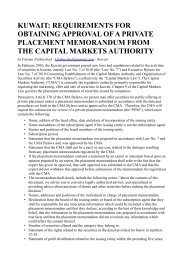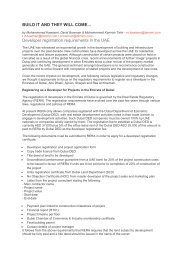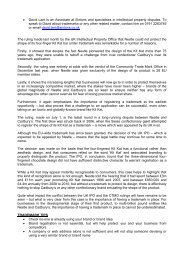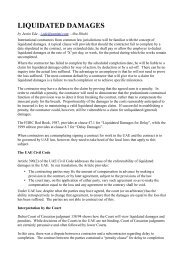Penalty clauses and liquidated damages: Traps for the ... - The Lawyer
Penalty clauses and liquidated damages: Traps for the ... - The Lawyer
Penalty clauses and liquidated damages: Traps for the ... - The Lawyer
Create successful ePaper yourself
Turn your PDF publications into a flip-book with our unique Google optimized e-Paper software.
<strong>Penalty</strong> <strong>clauses</strong> <strong>and</strong> <strong>liquidated</strong> <strong>damages</strong>: <strong>Traps</strong><strong>for</strong> <strong>the</strong> unwaryPublished: 22 Feb 2013Author: Rob CruiseLiquidated <strong>damages</strong> (LDs) <strong>clauses</strong> stipulate that a certain specified sum of money will be payableby one ('guilty') party to <strong>the</strong> o<strong>the</strong>r ('innocent') party, where <strong>the</strong>re has been a particular breach ofcontract.What are Penalties <strong>and</strong> Liquidated Damages?LDs are a useful contracting tool in commercial agreements, but <strong>the</strong>re is a danger that, if <strong>the</strong>y arenot considered properly or drafted correctly, <strong>the</strong>y may be construed as a 'penalty clause', <strong>and</strong><strong>the</strong>re<strong>for</strong>e unen<strong>for</strong>ceable under English law.<strong>The</strong> recent judgment in E-Nik Ltd v Department <strong>for</strong> Communities <strong>and</strong> Local Government hasreignited <strong>the</strong> debate about 'take or pay' <strong>clauses</strong> by confirming that such provisions could also fallfoul of <strong>the</strong> rule against penalties.What is all <strong>the</strong> fuss about LDs?LDs are often payable where <strong>the</strong>re is a delay in delivery or completion of a particular service, orwhere a service fails to meet certain specified targets.LDs bring a greater degree of certainty than relying on <strong>the</strong> contract law rules regarding claiminggeneral <strong>damages</strong> - you know how much you can recover (or how much you will pay) if a certaintype of breach occurs.LDs are also often better <strong>for</strong> preserving <strong>the</strong> commercial relationship - <strong>the</strong> guilty party pays <strong>the</strong> LD,<strong>the</strong>n <strong>the</strong> parties get on with per<strong>for</strong>ming <strong>the</strong> rest of <strong>the</strong> contract, ra<strong>the</strong>r than embarking on a moreprotracted <strong>damages</strong> claim. Suppliers often like to include LDs because, if drafted correctly, <strong>the</strong>y canact as a cap on <strong>the</strong> supplier's liability.What is <strong>the</strong> problem with LDs?As set out in <strong>the</strong> key judgment in this area - Dunlop Pneumatic Tyre Co. Ltd. v New Garage &Motor Co. Ltd. (1915) - in order <strong>for</strong> an LD cause to be en<strong>for</strong>ceable (ra<strong>the</strong>r than being a penalty), <strong>the</strong>sum payable upon breach must be a genuine pre-estimate of <strong>the</strong> loss <strong>the</strong> innocent party would sufferin respect of that breach. If <strong>the</strong> intention of <strong>the</strong> LD is to threaten <strong>the</strong> guilty party into per<strong>for</strong>mance(ra<strong>the</strong>r than to compensate <strong>the</strong> innocent party), it is likely to be seen as a penalty.Take or pay?A take or pay clause requires <strong>the</strong> buyer to pay <strong>for</strong> a minimum quantity of goods or services, whe<strong>the</strong>r<strong>the</strong> buyer actually takes <strong>the</strong> goods/services or not.In E-Nik Ltd v Department <strong>for</strong> Communities <strong>and</strong> Local Government (2012), Burton J of <strong>the</strong> HighCourt (citing his own judgment in a 2008 case) confirmed that a take or pay clause could inprinciple be construed as an unen<strong>for</strong>ceable penalty. On <strong>the</strong> facts, <strong>the</strong> clause in question, which
equired <strong>the</strong> client to take a minimum of 500 consultancy days, was commercially justifiable, didnot amount to oppression <strong>and</strong> was negotiated freely - so was not a penalty.Take or pay <strong>clauses</strong> have generally been seen to give rise to a debt ra<strong>the</strong>r than a <strong>damages</strong> claim <strong>for</strong>breach of contract, <strong>and</strong> <strong>for</strong> this reason it was commonly believed that <strong>the</strong> rule against penalties(which applies to specified sums payable upon a breach of contract) would not apply.Burton J stated in <strong>the</strong> E-Nik judgment that <strong>the</strong> client's failure to take <strong>the</strong> minimum number of daysgave rise to a debt ra<strong>the</strong>r than a <strong>damages</strong> claim, but he did not elaborate on why <strong>the</strong> rule againstpenalties could still be applied. It remains to be seen whe<strong>the</strong>r <strong>the</strong> courts will clarify this point infuture <strong>and</strong> whe<strong>the</strong>r take or pay <strong>clauses</strong> will continue to be subject to <strong>the</strong> rule against penalties.Is it justified?Recently, <strong>the</strong> courts have shown a consistent reluctance to interfere with commercial contractssigned by parties of broadly similar bargaining power.<strong>The</strong> difficulty of arguing that a clause is a penalty was highlighted by <strong>the</strong> case of Azimut-BenettiSpA (Benetti Division) v Darrell Marcus Healey (2010), where <strong>the</strong> High Court found that a clauseentitling a luxury yacht-builder to retain 20% of <strong>the</strong> purchase price of <strong>the</strong> yacht upon termination<strong>for</strong> late payment, was 'commercially justifiable' in <strong>the</strong> circumstances <strong>and</strong> <strong>the</strong>re<strong>for</strong>e not a penalty.In Cavendish Square Holdings BV <strong>and</strong> ano<strong>the</strong>r company v Makdessi (2012), <strong>the</strong> buyer purchased60% of <strong>the</strong> holdings in <strong>the</strong> world's largest advertising <strong>and</strong> marketing communications group, <strong>and</strong>had an option to buy <strong>the</strong> remaining shares.Payment <strong>for</strong> <strong>the</strong> shares would be in three instalments, <strong>and</strong> if <strong>the</strong> seller breached certain restrictivecovenants this would cancel any outst<strong>and</strong>ing instalments <strong>and</strong> trigger <strong>the</strong> option <strong>for</strong> <strong>the</strong> buyer topurchase <strong>the</strong> remaining shares at a discounted price (to reflect <strong>the</strong> impact of <strong>the</strong> breach on <strong>the</strong>valuable goodwill of <strong>the</strong> target company).<strong>The</strong> seller breached <strong>the</strong> restrictive covenants, but argued that <strong>the</strong> buyer's right to cancel <strong>the</strong>outst<strong>and</strong>ing instalments <strong>and</strong> buy <strong>the</strong> remaining shares at a discounted rate amounted to a penalty.However, <strong>the</strong> High Court found that although <strong>the</strong> rule against penalties could apply under suchcircumstances, <strong>the</strong> terms were not penal <strong>for</strong> <strong>the</strong>se key reasons:• <strong>the</strong>re was a commercial justification <strong>for</strong> <strong>the</strong> terms• <strong>the</strong>y were not extravagant or oppressive• <strong>the</strong> main purpose of <strong>the</strong> terms was to provide a clean break to <strong>the</strong> commercial relationship<strong>and</strong> to adjust consideration <strong>for</strong> <strong>the</strong> remaining shares to reflect <strong>the</strong> loss in goodwill caused by<strong>the</strong> breach• <strong>the</strong> terms were negotiated heavily by experienced solicitorsTips on how to make it less likely that your LD is deemed to bea penaltyAlthough each case is decided on its facts, <strong>the</strong>re are a number of guiding principles to be taken intoaccount when drafting an LD clause, including:• avoid specifying sums payable upon breach which are so high that <strong>the</strong>y cannot be seen ascommercially justifiable or a genuine pre-estimate of loss• different types of breach should generally attract payment of different sums in order to beregarded in each case as a genuine pre-estimate of loss• if <strong>the</strong> primary obligation is payment of a particular sum, <strong>the</strong>n breach of this clause shouldnot usually give rise to a 'penalty' payment of a much higher sum
• keep your calculations to show you have tried to assess likely damage <strong>for</strong> a particular breach• include contractual wording to say that <strong>the</strong> parties agree that <strong>the</strong> sum is a genuine preestimateof loss <strong>and</strong> not a penalty (although not decisive, this kind of wording can at least bepersuasive to <strong>the</strong> courts)• if drafting a take or pay clause, consider whe<strong>the</strong>r <strong>the</strong> specified sum is commerciallyjustifiable, in <strong>the</strong> light of <strong>the</strong> High Court's recent judgments stating that such <strong>clauses</strong> aresubject to <strong>the</strong> rule against penalties


